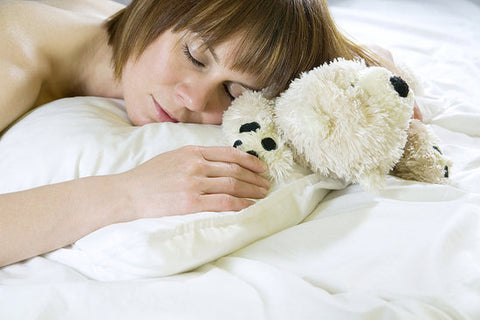If you still sleep with a stuffed animal, you’re not alone. A recent survey has shown that up to 40 percent of adults openly admit falling asleep with soft toys and blankets from their childhood.
So are those people belonging to the 40 percent “odd?” Is it weird to sleep with a stuffed animal?
Is Sleeping With Stuffed Animals Weird?

People’s emotional bond with stuffed animals is perfectly acceptable, so it's definitely not weird or unusual if you still sleep with a stuffed animal even as an adult.
As young children, people often curl up with teddy bears to feel safe and secure, and once a connection has been made, it can be a coping mechanism to deal with anxiety. In psychology, these are referred to as “transitional objects.” [1]
These objects help kids transition from dependence to independence, especially during their bedtime routine when their parent or caregiver is away from their childhood bedroom.
What Experts Say
According to Vivian C. Seltzer, psychologist and professor of human development and behavior at the University of Pennsylvania, it's particularly common for adults to keep transitional objects from their childhood. When young adults leave home to start college or a new job, they cuddle these objects as they remind them of a more secure time.
Krystal Javita Jagoo, a mental health professional and registered social worker from Toronto, seconds this. She adds that an adult can self-soothe with their childhood teddies and dolls during times of extreme stress, especially if they have nowhere else to turn.
Why Adults Sleep With Stuffed Animals
Out of Habit

Some people sleep with stuffed companions out of habit — nothing more to it. Some just got used to sleeping with a teddy bear at night as one might a pillow, and that’s nothing to be ashamed of.
To Find Comfort
Teddy bears can be a source of comfort for a person, especially when associated with safety and security during their childhood.
For Better Sleep

If you associate stuffed companions with letting go of all stresses and anxieties throughout the day, they can help you sleep better at night.
Helps Control Anxiety
They are often used in place of parents and caretakers for kids, especially when they have to sleep alone at night. These objects help them curb their anxiety and loneliness, which carries over to when they become adults.
Read: Stuffed Animals For Anxiety
Emotional Support

While sleeping with a teddy bear is generally positive, it can still have negative connotations.
Some children have been found depending on their stuffed teddy bear as a stand-in for emotional support, which they didn’t get from their parents. They carry this behavior well into adulthood.
Shop The Squishmallow Collection NowShould You Stop Sleeping With Your Stuffed Animal?
It depends. Whether or not you should still fall asleep with your stuffed companion depends on its representation in your life.
As long as it’s generally positive and not interfering with your daily function, interpersonal relationships, or personal integrity, using your favorite stuffed dog as a sleep aid is A-okay (and even highly recommended!).
However, if it’s meddling with your daily function like you don’t like inviting people over because you're worried that you’ll get teased over it, or it gets in the way of intimacy with a significant other, maybe it’s time to let it go.
How To Let It Go (If You Want To)

All breakups and losses in life are difficult — even that of an inanimate object. Of course, you have to understand the implications of losing the stuffed animal in sleep — will you be more stressed over losing it?
According to Dr. Inna Khazan, a clinical psychologist, it’s better to wean yourself slowly instead of letting go cold-turkey when it comes to your favorite stuffed companions.
Here’s how to start letting go:
- Move the stuffed animal from your bed to somewhere you can see it, like your bedside table or nightstand.
- Once you’re comfortable with the stuffed animal just slightly out of reach, move it farther away from your bed — like maybe in the corner of your room or on top of a dresser.
- After you’ve made your peace with that, move the stuffed animal farther away, where it’s out of reach and sight. Under the bed or inside the closet are ideal spots.
Some people don’t have the emotional energy for step three, while some adults grow out of it. You can still keep your stuffed animal within sight and reach, so that every time you’re stressed, you can easily pick it up and squeeze it.
A good alternative to a teddy bear are weighted blankets.
When Does It Become An Issue?
If sleeping with a childhood teddy bear helps you sleep better, there’s nothing wrong with cuddling with stuffed animals every night. After all, whatever helps us get a good night’s sleep is always seen as a positive (excluding alcohol and drugs).
However, this becomes an issue if the stuffed animal influences your relationships, whether work-related, friendship, or romantic.
Some people didn’t receive love from their parents as a child, so they turned to stuffed toys for emotional support. If you see that you turn to your stuffed animal for support instead of your friends or significant other, it can be a sign that there’s an underlying issue that needs addressing.
If you find yourself not keen on letting people visit you at home for fear that you’ll get questioned about the stuffed animal on your bed, that’s another issue. Having trouble traveling without your stuffed animal is also a red flag.
FAQs
Is sleeping with a stuffed animal a sign of trauma?
No, sleeping with stuffed animals is not necessarily a sign of trauma. Some people associate their stuffed toys with safety and security. Some people do it out of habit.
Why do people get emotionally attached to stuffed animals?
People get emotionally attached to stuffed animals because they serve as transitional objects from childhood. These people grow up to associate safety, security, and comfort with their stuffed friends and become emotionally attached to them to relieve their anxieties (as they did when they were children), even well into adulthood.
In Conclusion
No, sleeping with a stuffed animal isn’t weird and is completely normal. In a survey conducted with over 2,000 respondents, around 40 percent of people, with the largest group from millennials, openly admitted that they still slept with a teddy bear.
Stuffed animals become comfort objects for children when they transition from dependence to independence. They associate the stuffed companions with safety and security, which carries over well into adulthood.
Adults still sleep with these fluffy animals because, just like when they were children, they relieve them of their anxiety and allow them to get a better night’s sleep.
Experts see nothing wrong with this and even regard it as normal, as long as it positively influences your life.
Shop The Squishmallow Collection NowReference:
- https://www.healthychildren.org/English/ages-stages/baby/Pages/Transitional-Objects.aspx



